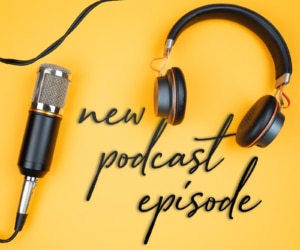How to optimize for a podcast & build podcast SEO
“Have you listened to this podcast before?”
I think it’s fair to say that most of us have a favorite podcast, whether it be an episode or a series that you listen to every week. Podcasts can be a great source of entertainment, education, and all things murder mystery. What’s more, podcasts are a great way for mental health service providers to get their name out there! Podcasting can be a great way to grow your practice, as it’s another way to share your content. In addition, having podcast episodes give you another opportunity to show up in web searches. What’s more, podcasts can be great for accessibility since they can accommodate other learning styles and preferences. So, with this in mind, creating a podcast for your practice could be a great idea for therapists!
 Why Would a Therapist Have a Podcast?
Why Would a Therapist Have a Podcast?
Fun fact: in 2019, Google made it public that podcasts that they had started including podcasts in search results. This means that podcasts have the same potential to show up in searches the way that websites, videos, and blog posts do. Pretty cool, huh?
When thinking about podcasting to help grow your practice, you might not know where to start.
There are a lot different paths to take. But, for our purposes, we’re going to focus on how to optimize SEO for podcasts. In addition to all of the wonderful knowledge you’ll get from this blog, Practice of the Practice offers great resources to start and grow a podcast. Creating a podcast can help grow your practice if you’re choosing the right topic and targeting the right audience. With the right approach, you can build podcast SEO and reach a bigger audience.
Yep, podcast SEO a thing. Here’s what you need to know.
First things first: what is podcast SEO?
Podcast SEO is, quite literally, “podcast search engine optimization.” When building podcast SEO, we’re focusing on getting your podcast to the first page of Google. Much like your website and blogs, you want your podcasts to show up to your ideal clients.
Second thing’s second: why should I worry about it?

If you’re producing podcasts in the hopes of attracting more clients and becoming more well-known, there’s really only one way to do that: having good SEO. If you don’t have good SEO, you don’t show up. Which, in the days of everything being online, this is imperative to the success of your practice. As a service provider in private practice, your time is limited. So, if you’re going to dedicate some time and energy to creating a podcast to attract a new audience, don’t you want the best ROI?
We know all of the things about the “why” behind podcast SEO, now we’ll switch gears to the “how” piece of the puzzle. Below are a few tips on building your podcast SEO.
Steps to building your podcast SEO
We’ll go into more detail below, but the basic steps for building podcast SEO include:
- Claim your podcast on Google Podcast Manager.
- Make a website for your podcast.
- Use Keywords in Your Podcast Title
- Pick the name of your podcast very carefully.
- Help Google build trust with your podcast.
- Optimize your SEO Title and Meta Description.
- Tie in social media.
Step 1 to building podcast SEO: Claim your podcast on Google Podcast Manager
Claiming your podcast on Google Podcast Manager is the same process that you follow when creating an account for Google My Business. This process allows you to “index” your podcast. Google indexing is paramount in SEO Land because it gives us an opportunity to get “credit” for what we do. I’ve provided a few links to other resources that explain what Google Indexing is and why it’s important, so feel free to check them out. The process below details how you set up this account. To remain transparent, these instructions came from Captivate’s blog about optimizing for podcasts.
Steps to Claim Your Podcast on Google Podcast Manager
- 1. Access Google Podcasts Manager through the Distribution page of your Captivate dashboard.
- Log in with your Google Account (or create one).
- Enter your podcast RSS feed URL.
- Preview your feed to make sure the episodes and artwork are pulling through correctly.
- Google will then send you a code to the email address associated with your RSS feed.
- Enter the code and verify ownership!
Step 2 to building podcast SEO: Make a website for your podcast
Some of you probably aren’t thrilled about this. Yes, you need to make a new website for your podcast. Ultimately, this is the best for SEO. In Google’s eyes, your practice and your podcast are two separate entities. Which, isn’t wrong. And, these two entities acquire SEO. Think of two siblings that play different sports. One plays soccer and the other plays basketball. While both children play sports, they can’t share equipment (no one wears shin guards in basketball and a soccer player would look silly wearing a basket jersey). It just won’t work. It’s the same for your practice and podcast. They need different equipment (i.e., websites) to both be successful.
Step 3 to building podcast SEO: Incorporating Keywords in Your Podcast Title

Just like service pages or blogs, it’s imperative that we include words and phrases that our ideal clients use. We’ve written many blogs about finding the right keywords for your ideal client. But, as a reminder, we want to use the words and phrases are clients are using. A way to incorporate this into a podcast would be to have a title full of keywords. While podcast SEO is a bit of a new concept for us, there are some transferable SEO skills to use when optimizing these podcasts. The best way to do this is to think about what your ideal client would search for. For example, it could be “podcasts about dealing with anxiety during the pandemic.” Or, “podcasts about setting boundaries.” Really think about what your ideal client would want to listen to.
Step 4 to building podcast SEO: Pick the name of your podcast very carefully.
This is your biggest opportunity to get keywords in. The name of your podcast does not have to be the same as your practice. Unless, of course, your practice name is full of keywords that you want to rank for. Even still, it will be more beneficial to have a different name for your podcast so you can build SEO for different sources: your website and your podcast. So, choose wisely!
Step 5 to building podcast SEO: Help Google build trust with your podcast
So, turns out Google does some pretty cool things with podcasts. When a podcast episode is posted, Google automatically transcribes the content. Google does this so it knows what the podcast episode is about and helps it to categorize the podcast appropriately. In return, this helps to have your podcast reach it’s intended audience.

However. And this is an important however.
Your podcast must have structure. I’ll say it again for the people in the back: Your podcast must have structure. Google needs to be able to follow a clear structure of your podcast. This means the content needs to be about the same topic or category. As we all know, Google’s top concern is giving the user a good experience. In Google land, that means providing the user with information that is relevant and trustworthy. And, that makes sense given the information that exists about the topic. It’s important to remember that Google will make this determination based on the transcription it creates from the episode. So, the content should be easily understood.
So, with this in mind, do what you need to.
Come prepared to class. Create an outline. If you’re featuring a guest on your show, give them questions to prepare ahead of time. Research the topics you’re covering. And, when you can, verbally site the sources (this way, Google will transcribe that source) so Google can determine that you know of other reputable sources.
Step 6 to building podcast SEO: Optimize your SEO Title and Meta Description
This is an example of crossover for SEO concepts. Much like optimizing a service page or blog post, you’ll need to optimize the meta title and meta description. For our friends that are new around here, here’s a brief rundown: a meta title is the title of the page that pops up on Google. If one of our amazing SEO specialists optimized your page, your meta title likely reads “The Service | Your Practice Name (sometimes) | Online Therapy/Counseling in Your Location.” The logic is that the title is full of keywords and location indicators.
A meta description is the blurb that shows up Google under your website title. It’s best to personalize this, otherwise Google will throw two random sentences on the meta description. The problem with that? Those two sentences don’t always make sense together. So, it’s much better if we have control over it and make it very compelling.
Step 7 to building podcast SEO: Tie in social media

We want to pull out all of the big guns when getting a podcast up and running. To make you’re reaching as many listeners as possible, it needs to be “seen” by users. A great way to do this is through social media. For those who aren’t familiar with the role of social media and SEO, social media can be a great way to get more eyeballs on your site. However, keep in mind that social media itself cannot directly “boost” your SEO. But, it can help get more people to your site when used effectively. Which, has the possibility of helping build SEO.
This relationship is a correlation, not causation.
So, with this in mind, a good tip is to share your podcast episodes on your practice’s social media page. Make a post about your podcast and provide a link to your page. This way, users can easily get to your site and start listening. Remember: we want to make this process as easy as possible for the user. The easier it is, the more accessible it is. And, the more likely they’ll return to your site.
Step 8 to building podcast SEO: Build Tons of Backlinks to Your Podcast Websites
You might be wondering why this step wasn’t after step 2 of making a website. This is on purpose. Backlinks are vital to building long-term SEO. Backlinks help to show Google that your website is trustworthy and reputable. For those of you that are new around here, a backlink is when another website links to your site. Essentially, this means that another website sees the content on your site to be valuable and useful. So much so, that they are willing to send their users to your site. There are many ways to build backlinks; some of which will surprise you!
However, building backlinks will take time.
Let me say that again. Building backlinks will take time. Building quality backlinks will require intentionality and dedication. But, it will be worth it. You can do this with your podcast website by linking to your practice’s website. However, do so sparingly. If this seems too “on purpose”, Google will catch on and be very upset. So upset that your website will be put on page farther back.
Hot tip for building backlinks & podcast SEO
When an episode goes live, send your guest a link to the episode with a badge or logo they can put on their website. This can be put on your social media pages, too. The goal is for them to link back. This way, you’ll get the “credit” for the backlink.
Begin SEO Services With Us!
Thanks for checking out this blog! At Simplified, we’re here to help with all of your SEO needs! We offer many different services to help you reach your SEO goals. We offer Done For You Services where do the optimization for your site. If you’re the hands-on type, we can teach you how to do the optimization in our 12-Week Intensive Program. In addition, we offer a variety of helpful courses and ala carte services. When you’re ready to begin services with us, follow these steps:
- Schedule a free 30-minute consultation with us.
- Get to know our team of highly skilled SEO specialists.
- Build your podcast SEO!
About the Author
Alyssa has been a member of the Simplified family for the past few months. And, is now stepping into a role providing training and additional support for folks learning SEO. As a current graduate student in the Advanced Placement MSW Program at Mizzou, Alyssa loves the world of mental health and technology. In addition, Alyssa has a growing interest in using social media to grow a practice, the importance of live feed, and building backlinks. She also wrote a two-part blog post series about the importance of blogging for SEO. This series addressed the importance of blogging and original content. In addition, she is co-hosting a blogging masterclass that will soon be available for purchase.





Leave a Reply
Want to join the discussion?Feel free to contribute!